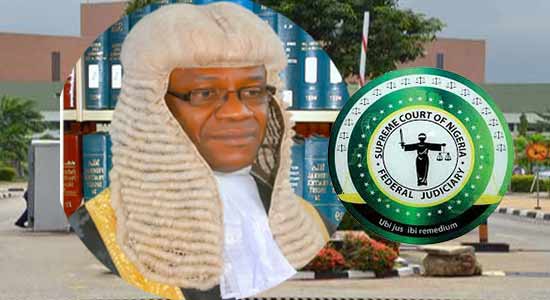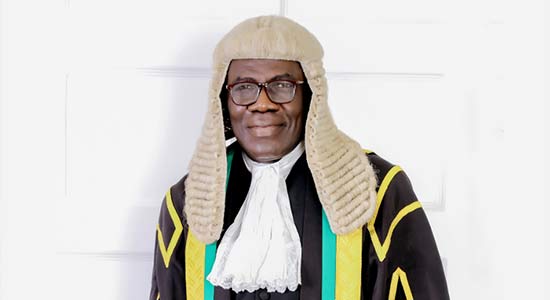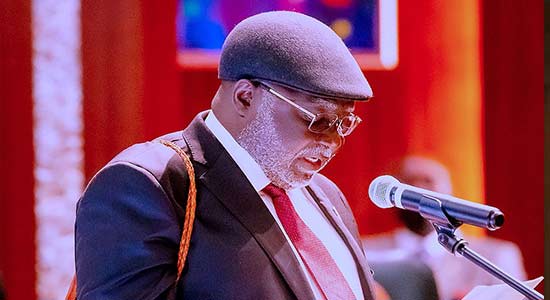JUDICIARY NEWS 24/05/2022
Review Judicial Officers’ Salaries, Allowances, Hon Justice Eko Rtd. Charges NJC, FJSC, RMAFC

Worried by the stagnation in the salaries and allowances of judicial officers, a retired Justice of the Supreme Court, Justice Ejembi Eko has called on the National Judicial Council (NJC), the Federal Judicial Service Commission (FJSC) and the Revenue Mobilisation Allocation and Fiscal Commission (RMAFC) to “synergize and introspect and tell the world why the dereliction since 2007.”
Speaking in Abuja on Monday, at a valedictory session held in his honour by the Supreme Court, Justice Eko who bowed out of the nation’s judiciary, having attained the mandatory retirement age of 70 years on Monday said, the constitution provides that judicial officers of the superior courts of law shall be paid salaries and allowances as may be prescribed by the National Assembly, “but not exceeding the amount as shall have been determined by the Revenue Mobilisation Allocation and Fiscal Commission.
“And these remuneration, salaries and allowances are, a charge upon the consolidated revenue fund of the Federation. The pertinent question is, who is in dereliction of the constitutional duty to review the remuneration, salaries and allowances of judicial officers since 2007?”
He said there has been several calls for the review of salaries of judicial officers and nothing has been done to remedy it and that the plight of retired judicial officers from various state High Court, Sharia Court of Appeal and Customary Court of Appeal is an embarrassment to the judiciary.
“By virtue of Section 6(3) and 5 and 84 of the constitution, their gratuities and pensions, being recurrent expenditure should be borne and payable to them by the NJC and not the state governments,” he said, even as he asked the NJC to direct Chief Judges to check the excesses of some state governors, who are not bordered on code of conduct for judicial officers and the constitutional provisions on separation of powers.
Eko also alleged that in many jurisdictions, chief registrars allow themselves “to be directed willy-nilly in the vandalization of the judiciary budget”.
He said despite an increase in the judiciary’s budgetary allocation, it was perplexing that judges’ welfare remained unimpressive.
Eko added that providing access for a probe of the judiciary’s financial records would not jeopardise its independence.
“My lords, the heads of court in the federation have enormous budgetary resources from which they can improve the welfare of serving judges,” he said.
“As it is presently, and as the director of budget in the federal ministry of finance disclosed recently at the memorial lecture in honour of the late Abdullahi Ibrahim, SAN, it is baffling that the welfare of judges remains in abject state, in spite of the increase of the budgetary allocation to the judiciary under this regime. Why?
“The said director of budget suggested that the panacea to the often touted underfunding of the judiciary would be for the judiciary to allow its books to be opened by the relevant authorities.
“This clearly is an allusion, albeit an indictment, pointing to the internal fraud attending to the management of the budgetary resources of the judiciary.
“Nothing stops the office of the auditor-general of the federation, the ICPC and other investigatory agencies from opening the books of the judiciary to expose the corruption in the management of their budgetary resources.
“That does not compromise the independence of the judiciary. Rather, it promotes accountability.
“In most jurisdictions, the chief registrars regard themselves as direct subordinates of even the spouses of heads of court and allow themselves to be directed willy-nilly in the vandalisation of the judiciary budget.”
Eko also accused the National Judicial Council (NJC) of applying double standards in the discipline of erring judges.
“With all deference to the NJC, the punishment fell short of the expectation of the public that these bad eggs should have been broken or smashed and/or exterminated to serve as a deterrence,” he said.
“When the punishment for an outstandingly bad and outrageous conduct is far too lenient, it encourages impunity and/or repeat by others of errant or atrocious misconduct.”
The Body of Senior Advocates of Nigeria, represented by Chief T. J Onomigbo Okpoko (SAN) called for a restructuring of the system of appeals to the Supreme Court to reduce the workload of the apex court to a tolerable level.
According to Okpoko, the nation cannot expect optional performance from overworked justices and added that rights of appeal to the apex court should be limited to decisions on the constitution and law alone.
Okpoko, also said while some stakeholders have called for the upward review of the retirement age for judges, others have suggested that supreme court justices should be made life benchers as in the United States’ supreme court.
“Although this suggestion looks attractive, especially against the backdrop of frequent retirement in recent years of justices, who look very well and strong at their retirement age, it is not feasible for now as our country is not developed and matured enough to adopt the retirement age of justices of the USA,” he said.
“This is because the society and social set-up of the US is not the same as the society and social set-up of Nigeria where our justices serve.
“In the US, a justice of the supreme court does not think of power outage, generating sets or diesel to run generators.
“American judges have full complements of highly trained qualified and efficient personal staff, who provide assistance to the justices in real time. Personal staff are appointed on the basis of competence and efficiency.
“Our own system has not developed to that stage. There is no provision in place for providing each justice of this supreme court, a full complement of such personal staff to assist their lordships. How many special consultants and researchers do we have in place? The facilities are simply not in the Nigeria court system.
“It is, therefore, not wise to consider increasing the retirement age of our serving justices for now. We do not have to adopt to our country, a retirement age suitable for USA but unsuitable for our country.”
In his speech, the Attorney General of the Federation (AGF) and Minister of Justice, Abubakar Malami (SAN), called on the judiciary to ensure accountability in it’s spending and to open it’s book for transparency
While eulogizing retired Justice Eko, Malami applauded the judiciary, especially the Supreme Court for ensuring effective Justice delivery in the country.
He said the Federal Government will support the judiciary in ensuring that all impediments to effective justice delivery are removed and also guarantee the independence of the judiciary as enshrined in the constitution.
The Chief Justice of Nigeria (CJN), Justice Ibrahim Tanko Muhammad, said the valedictory session held in honour of Justice Eko was a celebration of the “quintessential judicial officer, who has not only excelled in his career but also in the development of the nation and humanity.”



